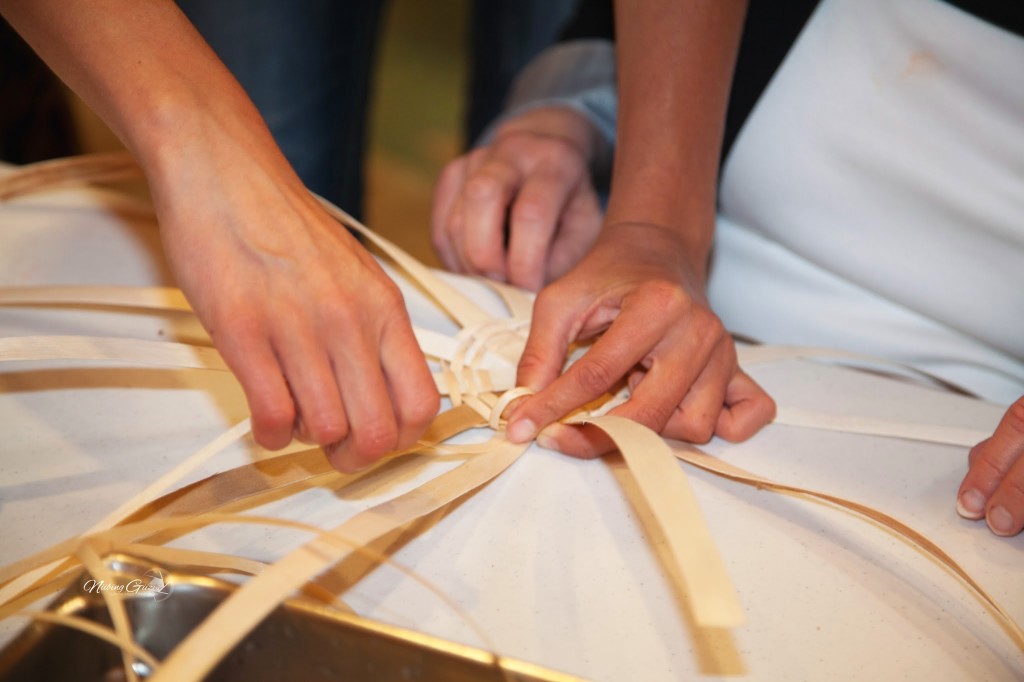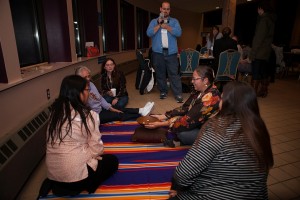 At each of our professional development gatherings, we’ve incorporated culture. Whether it’s etching designs on winter birch bark or playing kasu, they’re central to Convening Culture Keepers and Convening Great Lakes Culture Keepers.
At each of our professional development gatherings, we’ve incorporated culture. Whether it’s etching designs on winter birch bark or playing kasu, they’re central to Convening Culture Keepers and Convening Great Lakes Culture Keepers.

The cultural exchanges that take place during our gatherings are not only program examples, they accomplish something more. By practicing culture, it reminds us of the importance of our work. Maybe more importantly, though, it establishes powerful personal bonds between us.
Culture connects us.
At two gatherings, for instance, we’ve made black ash baskets. At the Forest County Potawatomi Cultural Center, Library and Museum, the Pigeon family taught us to weave. At Ziibiwing, the Pamp family walked us through the entire process from pounding to completion.
Over the years, TLAM has seemed a lot like basket making. Each year, in our attempt to make it more useful, we’ve added new elements. And it’s been amazing to see the project progressively take shape––how seemingly disparate pieces have synergy and complementary elements provide holistic learning opportunities.
So in planning this summer’s class, Michele and I wanted to weave together TLAM’s guiding principles. We wanted learning objectives linked to long term goals, like sustaining mutually beneficial relationships, supporting the capacity of tribal institutions, and providing education guided by Indigenous pedagogy.
According to Vine Deloria, Jr., knowledge cannot exist apart from relationships and the ethical considerations they entail. Nothing happens in isolation. In this class, then, we wanted to recognize ourselves not only as individuals, but as learners within communities. Moreover, we wanted to abide by the ethical responsibilities inherent in relationships, especially those with tribal communities.
To do that, the class is embedded within our new IMLS grant. Over three years, SLIS will provide continuing education for tribal librarians, archivists, and museum curators as they collaboratively develop a traveling exhibition. This summer term, we used project-based learning to accomplish a significant goal: we supported the effort by creating a detailed exhibition development plan together.
In the processes, we explored topics like:
- Indigenous information environments
- Indigenous knowledge and pedagogy
- The history of exhibits
- Exhibit theory
- Learning theory
- Outcomes-based program planning and evaluation
- Indigenous evaluation
- Exhibit theme development
- Exhibit design
- And survey design
Indigenous pedagogy requires more, though. According to Lawrence W. Gross, it emphasize things like family, community, place, balance, observation, visioning/creativity/imagination, humor, and accretive thinking.
And cultural competence, a process that leads to a “highly developed ability to understand and respect cultural differences and to address issues of disparity among diverse populations competently,” demands more. Namely, as Patricia Overall suggests, it requires building cultural self-awareness, cultural knowledge, cultural appreciation, and an ethic of genuine caring through “actual contact with people.”
So, for two weeks this summer, students personally experienced the elements of Indigenous pedagogy and practiced their cultural competence. They worked at two tribal cultural institutions, the Lac Courte Oreilles Ojibwa Community College Library and Red Cliff’s new Ginanda Gikendaasomin Interim Library. In the process, they renewed our relationships, supported tribal institutions, and hopefully learned a lot.
In short, they wove together TLAM.
Michele and I are excited to share what we accomplished together.
Check back soon for posts from the students!
And, by the way, here are the articles I mentioned…
Gross, L. W. (January 01, 2010). Some elements of American Indian pedagogy from an Anishinaabe perspective. American Indian Culture and Research Journal, 34, 2, 10-26.
Overall, P. M. (April 01, 2009). Cultural Competence: A Conceptual Framework for Library and Information Science Professionals. Library Quarterly, 79, 2, 175-204.
